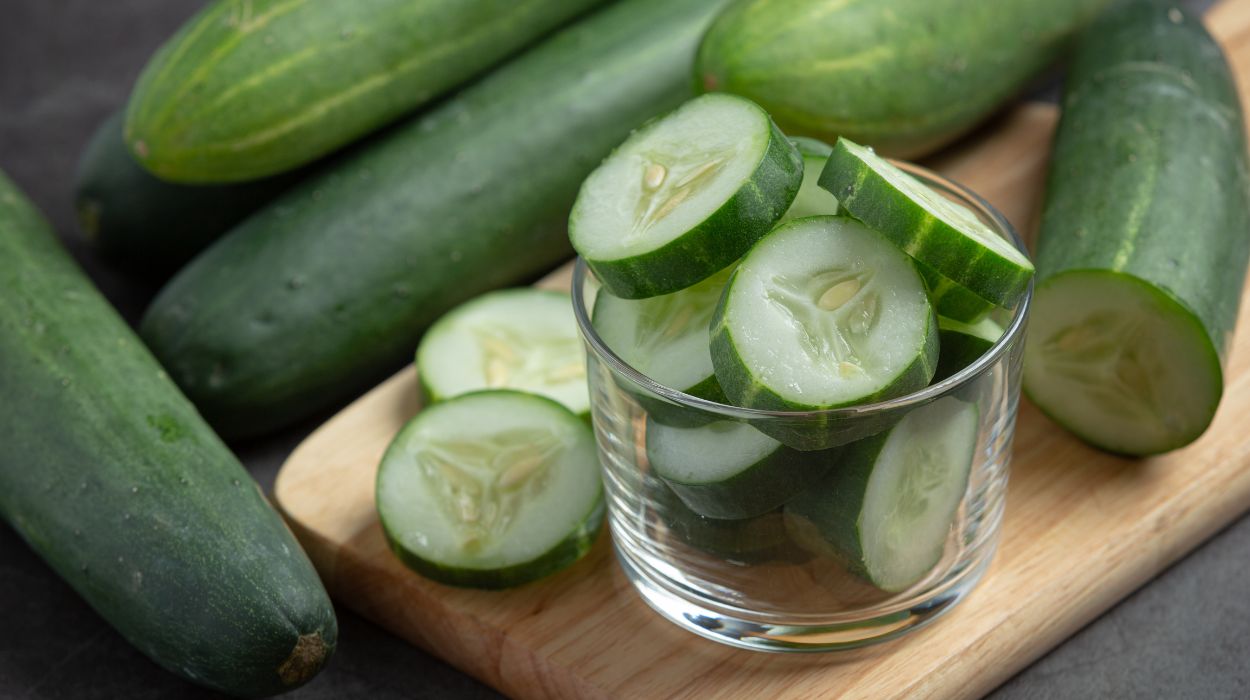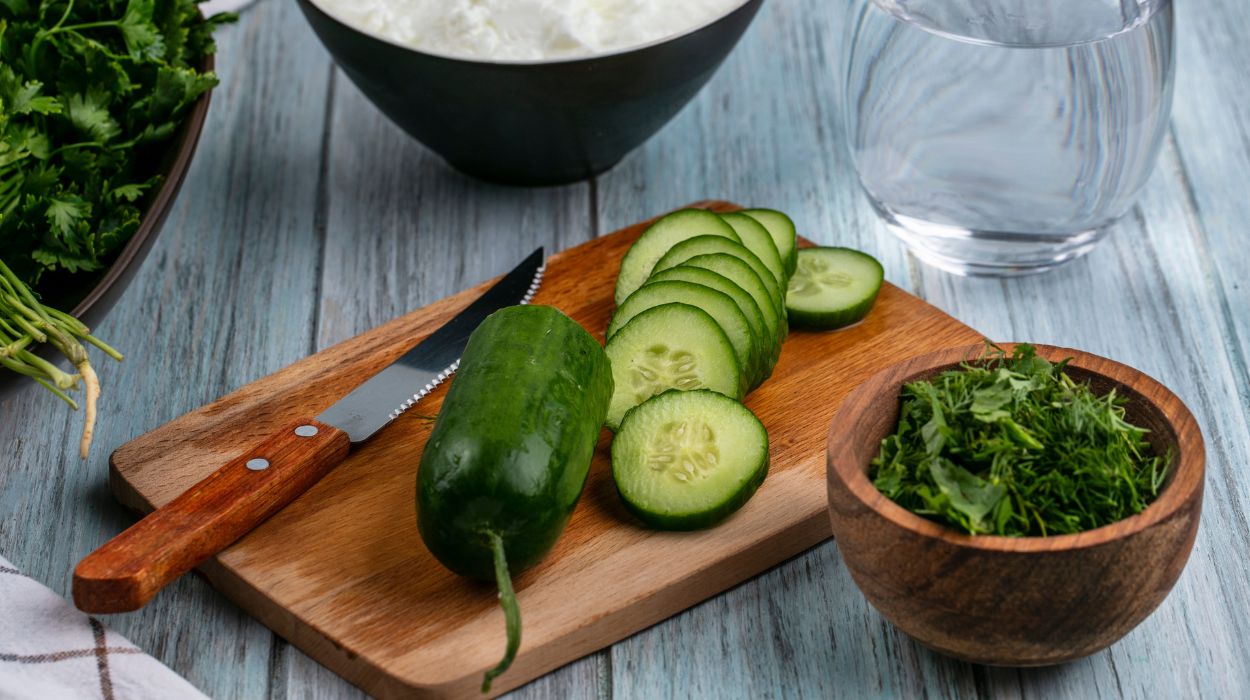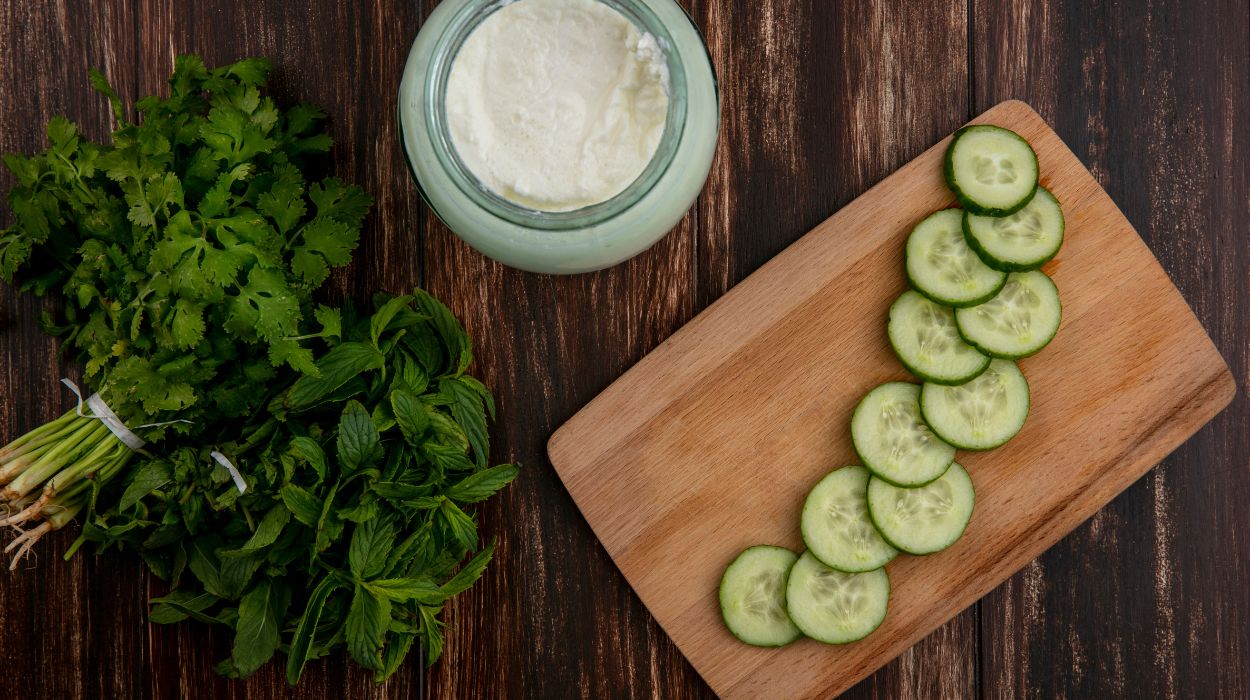 Expert's opinion
Expert's opinion
Expert's opinion
The article is a subjective view on this topic written by writers specializing in medical writing.
It may reflect on a personal journey surrounding struggles with an illness or medical condition, involve product comparisons, diet considerations, or other health-related opinions.
Although the view is entirely that of the writer, it is based on academic experiences and scientific research they have conducted; it is fact-checked by a team of degreed medical experts, and validated by sources attached to the article.
The numbers in parenthesis (1,2,3) will take you to clickable links to related scientific papers.
7 Cucumber Benefits For Your Health You May Not Know In 2024

There are not many foods out there that are as hydrating as a cucumber. Fresh cucumbers have a high water content,[1] are low in calories, and offer numerous health benefits.
The benefits of cucumber lemon water are health-promoting, but there are many other ways to eat or use cucumbers to gain health benefits. To learn more about cucumber benefits, keep on reading.
What Are The Benefits Of Cucumber?
Is cucumber good for you? Here are several benefits of cucumber for your health:
- Exhibits anti-cancer properties.
- May lower blood sugar, thus, preventing diabetes.
- May promote weight loss.
- Enhances hydration.
- Enhances the health of the skin.
- Promotes good bone health.
- Promotes good heart health.
Amazing Cucumber Benefits For Your Health

Anti-Cancer Potential
A fascinating aspect of cucumber composition is its many plant compounds with anti-cancer potential.
Cucumbers contain cucurbitacins, which have been shown through numerous human cell studies to have antitumor effects[2] alone or combined with anticancer chemicals.
Cucumbers also have phytochemical and therapeutic potential. A 2019 cell study investigated the impact of cucumber leaf extract on cancer activity and found there was anti-cancer activity.[3]
Lastly, the flavonoid fisetin is another phytochemical found in cucumbers. A 2021 review concluded fisetin has anticancer activity[4] by suppressing cancer cell stages, preventing the progression of cell cycle growth, and inducing the death of cancer cells.
While these findings are promising, more research is required with human trials to draw a solid conclusion.
Cucumbers are still great to include in your diet. The 2020 American Cancer Society guidelines for diet and physical activity for cancer prevention recommend that consumers eat a variety of fruits and vegetables,[5] including dark green vegetables, to reduce their cancer risk.
Anti-Diabetes
In 2014, an animal study showed fruit pulp extract from cucumbers lowered blood sugar levels among diabetic[6] rats.
More recently, a 2022 review of the test tube and animal studies investigated the anti-diabetic[7] impact among various cucumbers. The study determined cucumbers did have a hypoglycemic effect.
The review also found cucumbers to have antioxidant, anti-inflammatory, anti-obesity, and protective effects on cells and organs and that they promoted the control of blood cholesterol.
However, more research with large human trials is required before recommendations can be made regarding cucumbers and blood sugar control.
Weight Loss
Research has shown consuming low energy-dense foods, such as those high in water and fiber content, was associated with weight loss[8] among obese individuals.
Since cucumber has high water content and is a source of fiber, it could help promote weight loss among individuals with obesity.
While weight loss supplements are available, ultimately, weight loss can be achieved[9] through increased fruit and vegetable consumption while achieving an overall daily calorie deficit.
Hydration
Water is essential for health, and maintaining hydration[10] is important for overall health and digestion. Although drinking water and other fluids will maintain hydration, eating foods with high water content, such as cucumbers, will also help.
A 2013 study showed children with regular intake of fruits and vegetables, including cucumbers, had improved hydration[11] status.
Another study completed in 2016 showed that while total water intake mostly came from fluids, between 27% to 36% came from food moisture.[12]
While drinking water is the best way to stay hydrated, it’s important to consider how foods can also help with your hydration status. If you don’t enjoy the taste of water, you can always add in some cucumbers and lemons for additional flavoring.
The benefits of cucumber water, or the benefits of cucumbers and lemon water, will still include hydration and will have more flavor than plain water. Another option is cucumber juice, as the benefits of cucumber juice also include hydration.
As a popular constipation remedy on the internet, are there benefits of cucumber juice on an empty stomach? While there is no evidence drinking cucumber water while hungry will make you have a bowel movement, maintaining a good hydration status will promote healthy digestion overall.
Skin Health
There are also benefits of cucumbers on the face and in skin care.
A 2015 review article reported cucumber flesh, and seeds can be used as ingredients in cosmetics to treat wrinkles, treat sunburns, maintain skin elasticity, and prevent aging.
A 2016 review stated the benefits of cucumber for the skin go beyond topical application. Consuming cucumber can augment cellular water and is a source of antioxidants, which may address skin discoloration and aging while protecting against skin damage.
There are also benefits of cucumber on eyes, as a 2022 study determined applying an under-eye cream with cucumber extracts was effective in reducing dark eye circles.
These findings highlight the benefits of cucumber to women and men concerned about skin appearance.
Bone Health
A 2018 study determined that 10 milligrams twice daily of cucumber extract effectively reduced osteoarthritis knee pain[13] and could potentially be used to treat knee pain and stiffness.
While more research is needed to determine if cucumber can be used in pain management therapy among individuals with osteoarthritis, there is no doubt that eating cucumber is good for bone health.
Cucumbers are a great source of vitamin K. While this vitamin K[14] is known for its blood-clotting benefits, it’s also an essential vitamin for bone health and regulates calcium absorption. Individuals with low vitamin K levels are at a higher risk of bone fracture. Ensuring you consume adequate amounts of vitamin K is essential for your health.
Heart Health
Vitamin K is also important for heart health. Research has shown vitamin K deficiency is associated with poor heart health[15] outcomes.
Increasing vitamin K intake, however, can reduce arterial stiffness, slow the progression of vascular calcification, lower the incidence of diabetes and heart disease, and decrease the risk of death associated with heart disease.
What Are Cucumbers?
While cucumbers are part of the Cucurbitaceae family and are commonly called vegetables, they’re fruits.[16] They come in many shapes and sizes. However, store cucumbers will typically be elongated and cylindrical, as this is the preferred shape by most consumers.
Cucumbers come in wide varieties as they are grown around the world. Some types of cucumbers are snake cucumbers, Japanese cucumbers, and Persian cucumbers. The most common type you will likely find in America is the English cucumber.
Nutritional Value Of Cucumbers
Nutritional facts[17] within a one-half cup, or 52 grams, of sliced cucumbers:
- Energy: 7.8 kilocalories
- Water: 49.5 grams
- Protein: 0.34 grams
- Fat: 0.06 grams
- Carbohydrates: 1.89 grams
- Fiber: 0.26 grams
- Sugars: 0.87 grams
- Magnesium: 6.76 milligrams
- Potassium: 76.4 milligrams
- Phosphorus: 12.5 milligrams
- Manganese: 0.041 milligrams
- Vitamin C: 1.46 milligrams
- Beta carotene: 23.4 micrograms
- Vitamin K: 8.53 milligrams
As you can see, cucumbers are low in calories and about 95 percent water. They also contain many nutrients, which is why there are so many cucumber benefits.
How To Add Cucumber To Your Diet

One of the best things about cucumbers is their versatility. There are many ways to eat cucumbers; listed below are some ideas.
- Eat cucumber slices as a refreshing snack on a hot day.
- Chop unpeeled cucumbers into cubes and add to a Greek salad.
- Place a peeled and sliced cucumber into a sandwich.
- Top sliced cucumber with cream cheese and add seasoning to make cucumber bites.
- Chop raw cucumber into sticks and eat with your favorite vegetable dip.
- Use raw cucumbers to make homemade dill pickles.
Remember, eating a variety of food is how you stay healthy. While you can take supplements derived from vegetables to consume essential nutrients, eating various fruits and vegetables will help you get the nutrient content you need.
Side Effects And Precautions
Cucumbers have been shown to cause oral allergy syndrome. Oral allergy syndrome occurs when individuals who are allergic to pollen have an allergic reaction from eating foods, often uncooked fruits or vegetables. This is because the pollen allergen and food allergen are similar.
People who are allergic to ragweed pollen may have an allergic reaction to eating cucumber.
The Bottom Line
Eating cucumbers is a great way to get many essential nutrients. There are many benefits associated with eating cucumbers, and it would be a great addition to a healthy diet.
Remember, variety is key! Eating cucumbers and various other vegetables and fruits is a great way to achieve a healthy body weight and stay well and free of disease.
+ 17 sources
Health Canal avoids using tertiary references. We have strict sourcing guidelines and rely on peer-reviewed studies, academic researches from medical associations and institutions. To ensure the accuracy of articles in Health Canal, you can read more about the editorial process here
- Naureen, Z., Dhuli, K., Donato, K., Aquilanti, B., Velluti, V., Matera, G., Iaconelli, A. and Bertelli, M. (2022). Foods of the Mediterranean diet: citrus, cucumber and grape. Journal of preventive medicine and hygiene, [online] 63(2 Suppl 3), pp.E21–E27. doi:https://doi.org/10.15167/2421-4248/jpmh2022.63.2S3.2743.
- Alghasham, A.A. (2013). Cucurbitacins : A Promising Target for Cancer Therapy. International Journal of Health Sciences, [online] 7(1), pp.77–89. doi:https://doi.org/10.12816/0006025.
- Tuama, A.A. and Mohammed, A.A. (2019). Phytochemical screening and in vitro antibacterial and anticancer activities of the aqueous extract of Cucumis sativus. Saudi Journal of Biological Sciences, [online] 26(3), pp.600–604. doi:https://doi.org/10.1016/j.sjbs.2018.07.012.
- Imran, M., Saeed, F., Gilani, S.A., Shariati, M.A., Imran, A., Afzaal, M., Atif, M., Tufail, T. and Anjum, F.M. (2020). Fisetin: An anticancer perspective. Food Science & Nutrition, [online] 9(1), pp.3–16. doi:https://doi.org/10.1002/fsn3.1872.
- Rock, C.L., Thomson, C., Gansler, T., Gapstur, S.M., McCullough, M.L., Patel, A.V., Andrews, K.S., Bandera, E.V., Spees, C.K., Robien, K., Hartman, S., Sullivan, K., Grant, B.L., Hamilton, K.K., Kushi, L.H., Caan, B.J., Kibbe, D., Black, J.D., Wiedt, T.L. and McMahon, C. (2020). American Cancer Society guideline for diet and physical activity for cancer prevention. CA: A Cancer Journal for Clinicians, [online] 70(4), pp.245–271. doi:https://doi.org/10.3322/caac.21591.
- Abubakar, N.S., Florence, I.O. and Iyanu, O.O. (2014). Phytochemical screening and hypoglycemic effect of methanolic fruit pulp extract of Cucumis sativus in alloxan induced diabetic rats. Journal of Medicinal Plants Research, 8(39), pp.1173–1178. doi:https://doi.org/10.5897/jmpr2014.5506.
- Huerta-Reyes, M., Tavera-Hernández, R., Alvarado-Sansininea, J.J. and Jiménez-Estrada, M. (2022). Selected Species of the Cucurbitaceae Family Used in Mexico for the Treatment of Diabetes Mellitus. Molecules, [online] 27(11), p.3440. doi:https://doi.org/10.3390/molecules27113440.
- Stelmach-Mardas, M., Rodacki, T., Dobrowolska-Iwanek, J., Brzozowska, A., Walkowiak, J., Wojtanowska-Krosniak, A., Zagrodzki, P., Bechthold, A., Mardas, M. and Boeing, H. (2016). Link between Food Energy Density and Body Weight Changes in Obese Adults. Nutrients, [online] 8(4), p.229. doi:https://doi.org/10.3390/nu8040229.
- Dreher, M.L. and Ford, N.A. (2020). A Comprehensive Critical Assessment of Increased Fruit and Vegetable Intake on Weight Loss in Women. Nutrients, [online] 12(7), p.1919. doi:https://doi.org/10.3390/nu12071919.
- Liska, D., Mah, E., Brisbois, T., Barrios, P.L., Baker, L.B. and Spriet, L.L. (2019). Narrative Review of Hydration and Selected Health Outcomes in the General Population. Nutrients, [online] 11(1), p.70. doi:https://doi.org/10.3390/nu11010070.
- Montenegro-Bethancourt, G., Johner, S.A. and Remer, T. (2013). Contribution of fruit and vegetable intake to hydration status in schoolchildren,,. The American Journal of Clinical Nutrition, [online] 98(4), pp.1103–1112. doi:https://doi.org/10.3945/ajcn.112.051490.
- Guelinckx, I., Tavoularis, G., König, J., Morin, C., Gharbi, H. and Gandy, J. (2016). Contribution of Water from Food and Fluids to Total Water Intake: Analysis of a French and UK Population Surveys. Nutrients, [online] 8(10), p.630. doi:https://doi.org/10.3390/nu8100630.
- Nash, R.J., Azantsa, B.K.G., Sharp, H. and Shanmugham, V. (2018). Effectiveness of Cucumis sativus extract versus glucosamine-chondroitin in the management of moderate osteoarthritis: a randomized controlled trial. Clinical Interventions in Aging, [online] Volume 13, pp.2119–2126. doi:https://doi.org/10.2147/cia.s173227.
- Rodríguez-Olleros Rodríguez, C. and Díaz Curiel, M. (2019). Vitamin K and Bone Health: A Review on the Effects of Vitamin K Deficiency and Supplementation and the Effect of Non-Vitamin K Antagonist Oral Anticoagulants on Different Bone Parameters. Journal of Osteoporosis, [online] 2019, pp.1–8. doi:https://doi.org/10.1155/2019/2069176.
- Hariri, E., Kassis, N., Iskandar, J.-P., Schurgers, L.J., Saad, A., Abdelfattah, O., Bansal, A., Isogai, T., Harb, S.C. and Kapadia, S. (2021). Vitamin K2—a neglected player in cardiovascular health: a narrative review. Open Heart, [online] 8(2), p.e001715. doi:https://doi.org/10.1136/openhrt-2021-001715.
- Grumet, R., Lin, Y.-C., Rett-Cadman, S. and Malik, A. (2022). Morphological and Genetic Diversity of Cucumber (Cucumis sativus L.) Fruit Development. Plants, [online] 12(1), p.23. doi:https://doi.org/10.3390/plants12010023.
- Usda.gov. (2023). FoodData Central. [online] Available at: https://fdc.nal.usda.gov/fdc-app.html#/food-details/168409/nutrients.

